
"I want all the ways in this world to be under the blue sky; I want this clear world to have kingly rules for everything. For one breath, for a reason, for a sacrifice, I will go to the end!" Ending of the movie "The Three Brigades" , accompanied by Liu Huan's majestic and high-pitched singing, the end of twelve years of unremitting pursuit of the murderer, Cheng Bing walked under the mottled sunlight of the tree shadows.
"The Three Brigades" is adapted from real events and was originally published on "NetEase Human World Studio". The original title was "Please tell the director that the mission of the Three Brigades has been completed" (author Shenlan). The film tells the story of the third team led by criminal investigation team leader Cheng Bing (played by Zhang Yi), who in the process of handling a vicious home invasion, rape and murder case, led to the accidental death of a suspect and was sentenced to prison. After being released from prison, under the leadership of Cheng Bing, he "went through all the hardships but never changed his mind" and insisted on continuing to pursue the murderer as an ordinary person.
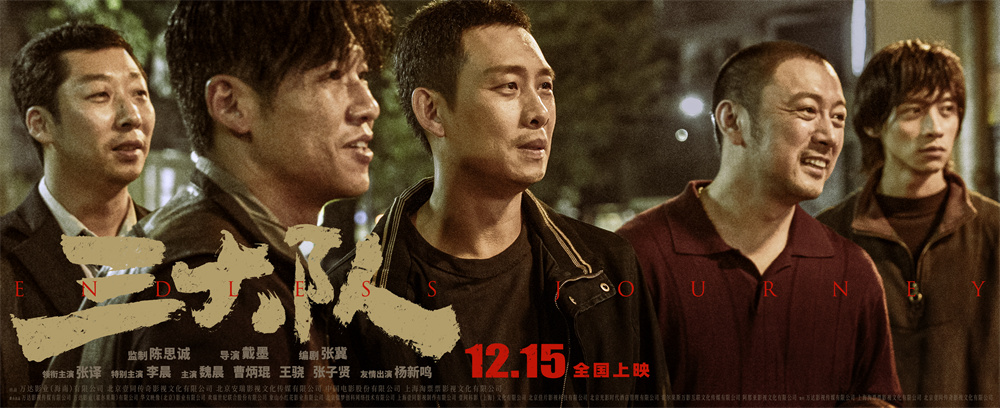
"Three Brigades" poster
The film was released nationwide on December 15, and the total box office of advance screenings and pre-sales has exceeded 100 million. It not only stands out from the crowd of crime films in domestic theaters at the end of the year, but also presents a unique style in this genre that has been rarely seen in recent years. Realistic look. Director Dai Mo once said, "In this creative process, I am more inclined to pursue a sense of reality. At the same time, during the shooting process, I also strive to delegate my skills to the actors' performances and documentary texts, and use the camera to capture those real moments."
Looking at the creative team behind "The Three Brigades", the mixed combination of producer Chen Sicheng and screenwriter Zhang Ji is undoubtedly even more amazing. As we all know, as the operator of the blockbuster movies "Detective Chinatown" series and "Manslaughter" series in recent years, Chen Sicheng is good at constructing suspense stories in Chinese communities outside the mainland, and uses typographical elements to the extreme. The screenwriter Zhang Ji has been deeply involved in creation in the field of realism themes since he became famous with "Chinese Partner". What kind of chemical reaction can be produced when two filmmakers who have had no overlap in creative purposes collaborate for the first time? Undoubtedly, this is the biggest highlight besides the ups and downs of the plot and the stellar cast of actors showcasing their acting skills.
"During the creation process this time, sometimes I thought, was it too plain? Instead, Sicheng insisted that I help him pull it back. We often say, if you haven't picked it up, how can you put it down? Cheng Bing This character can only let go after he finally catches the criminal. The same goes for Sicheng. In the past, he played the genre to the fullest and achieved great box office success, so this time he insisted on returning to his original nature, which is even more extreme than what I pursued. "Recently, Zhang Ji said in an exclusive interview with a reporter from The Paper.

Screenwriter Zhang Ji
【dialogue】
"This is the first time such a story is shown on the big screen"
The Paper : The movie "The Third Brigade" is adapted from the online documentary "Please tell the Director, the mission of the Third Brigade has been completed." I would like to hear what points in it touched you the most?
Zhang Ji : The text on the Internet is not long, and I browsed it quickly. The most touching point is that in an era when confessions were emphasized for conviction, the Third Brigade, out of righteous indignation and commitment to solve the case within a time limit, led to the death of a criminal suspect. This was a very big accident, and the three teams also paid a huge price and embarked on a journey of life reversal. The online text discusses this matter head-on. The emotion, reason, and law in it constitute a huge dramatic tension. The film should be the first time such a story has been shown on the domestic big screen.
The Paper : "Third Brigade" is a work with obvious criminal investigation elements. In a relatively unfamiliar field, how do you get familiar with the criminal police industry?
Zhang Ji : Lower life has always been my habit of writing scripts. When I went to the Public Security Bureau, I found that the criminal police team has its own characteristics. After they graduate from the police academy, they usually go to the police station for training. At this time, there will be an old criminal policeman in the metropolitan area as their master to familiarize them with the work. Young people are full of energy, and when they become detectives, they all want to solve major cases. At this time, the old detectives will warn them, just like in the movie, Lao Zhang (played by Yang Xinming) said to Xu Yizhou (played by Wei Chen), "You won't understand until you are my age. Behind every major case there is a family tragedy, and how many people have changed their lives." He will tell his experiences and lessons to young people. Fighting crime is one aspect, but also to protect yourself at work and not do unnecessary things. sacrifice. In other words, the criminal police team has a special relationship with teachers, and I applied this to the script writing. Lao Zhang's relationship with Cheng Bing and Cheng Bing's relationship with Xu Yizhou all have the color of this master-disciple relationship.
In addition, the criminal police team is bound to shed blood and sacrifice when facing brutal criminals, so they pay special attention to the camaraderie between them. This is not the vulgar calling of brothers in society, but a person who is a criminal policeman. His back must be reserved for his brothers (protection). This is a relationship of absolute trust from birth to death. Of course, there are many details about their work and life, including the fact that it is really not easy for the families of criminal police officers. They also make a lot of sacrifices in their daily lives, especially if their relatives fall on the job, their descendants and children often Psychological problems can occur. Like Lao Zhang, he did not fall down directly in the process of arresting criminals, but only fell ill and was sent to the hospital after arriving home. Can it be determined to be a work-related injury? The rigid side of the system can be quite frustrating sometimes.
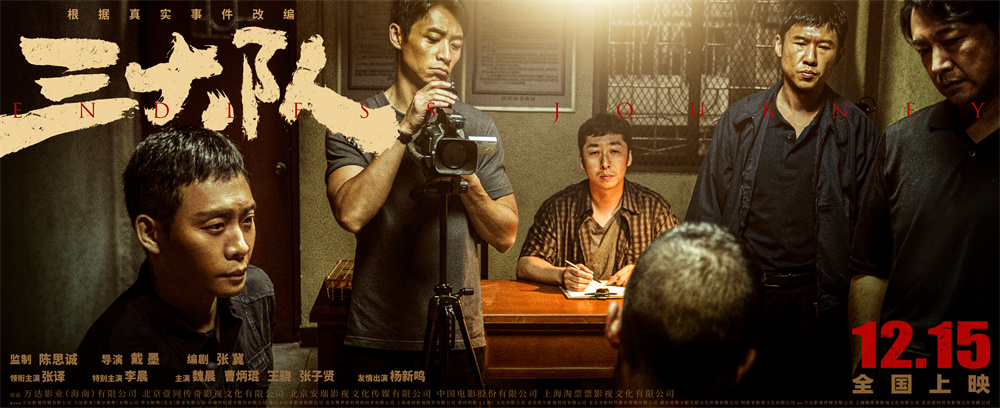
"Three Brigades" poster
The Paper : "The Three Brigades" mainly shows the social scene in the first decade of the new century. How can it be accurately restored in the movie? What are your views?
Zhang Ji : I like to use props and other background information as details to reveal the style and changes of the times. In the past, it was used to the extreme in "Chinese Partners", but this time it was used more restrainedly. Of course, the audience can see the changes in Cheng Bing's mobile phone, including the chat between Cheng Bing and Cai Bin by the river, and the unintentional sentence "It is now popular to be a courier." These all explain the changes of the times. In another place, after Cheng Bing was released from prison, someone stuffed a real estate brochure on the pedestrian bridge. There was a sentence on it, "What you need is not a house, but a home." This is the most glorious real estate in China. , a very classic slogan. The audience can pay attention to these details during the second brush.
The Paper : The song "Young Aspirations Don't Tell Sorrows" appears at least twice in the movie. It corresponds to the 1987 TV series "Plain Clothes Police". Let's talk about the impact of this TV series on you. In addition, the ending song "The Way of the World" is also sung by Liu Huan. Tell us about your feelings.
Zhang Ji : "Young Aspirations Don't Tell the Sorrows" is the theme song of the TV series adapted from Teacher Hai Yan's novel "Plain Clothes Police". I had an impression of it when I was a child. In addition, my uncle is a criminal policeman. When I was a child, I observed them gathering for dinner, and this song was always sung during the dinner. Zhang Yi also has many police friends. During the script meeting, we both mentioned that this song must appear at the gathering of the three brigade in the film. Because in a sense, it is the "Police Song", which has a basis in life. At the same time, the first half of the story of "Plain Clothes Police" also tells the story of police officers who were wrongfully imprisoned and continued to perform their duties after being rehabilitated and released from prison. This is also intertextual and contrasting with the story of "Three Brigades" to a certain extent.
"Young Aspirations Don't Tell the Sorrows" is teacher Liu Huan's famous song. I really didn't expect to ask him to record the ending song "The Way of the World" this time. It is very rare for a movie to have a singer of this caliber singing. Regarding the ending song, we originally wanted to follow the style of Jiang Yuheng's "Looking Back Again", which looks back with true feelings and expresses the sadness of middle-aged people. Later, the lyricist Tang Tian took a different path. The lyrics and music style of "The Way of the World" is reminiscent of another masterpiece of teacher Liu Huan, "Song of a Hero", which is rough, heroic and uplifting. I'm used to writing songs in scripts, and "Looking Back" originally mentioned them, but Sicheng didn't use them this time, and instead chose stylized songs and soundtracks.
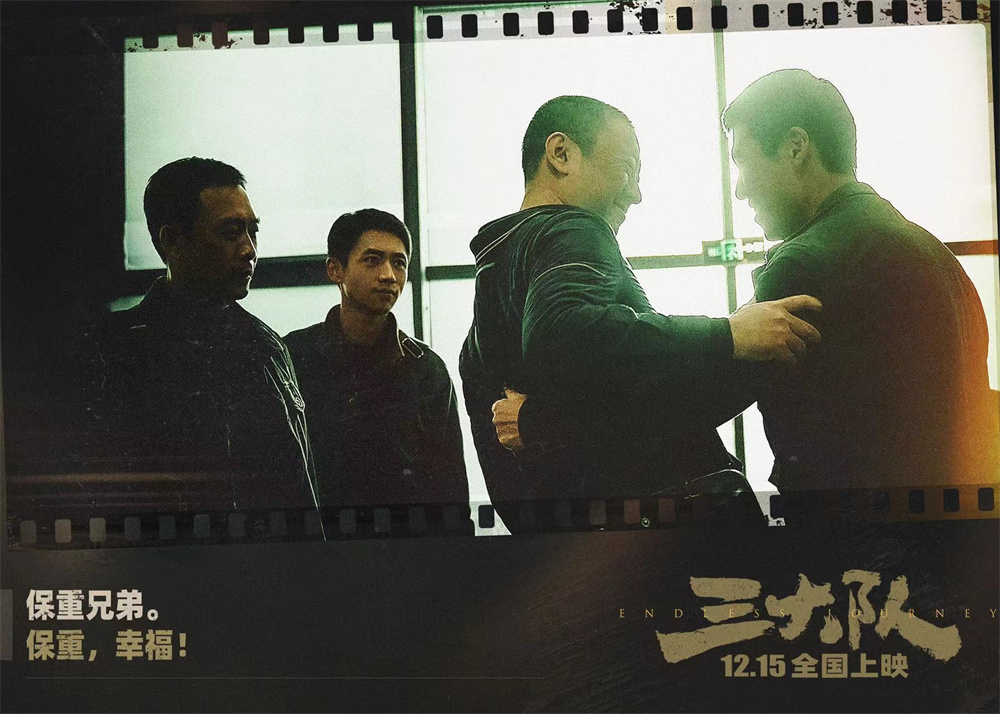
Stills of "The Three Brigades"
"This time I decided to write a group portrait right from the start."
The Paper : I know your work habits. The script outline is never sloppy, and half of the script is even completed during the outline stage. In the original work, after the members of the third brigade were released from prison, the main story was about the captain Cheng Bing chasing the murderer alone, but in the movie, these team members experienced "getting together and breaking up" together with the captain. This is a relatively large adaptation. Talk about your thoughts.
Zhang Ji : I was relatively lucky this time. Creation sometimes goes off the rails, and I have to think over and over until I finally come up with a plan, and it may even be a compromise. This time I decided to write a group portrait as soon as I read the novel. Expand the lonely individual behavior into a collective re-gathering, and experience the process of gathering and dispersing. Later, when I talked about the script with Sicheng, he also liked the "gathering and separation" of the three teams in it the most.
There is space and writing for a group portrait play. The group portrait also confirms the significance of Cheng Bing's persistence until the end. And from the logic of realist creation, the most difficult and most charming point is the creation of group portraits. For example, "A Dream of Red Mansions" is not like a modern Western novel, which is about the protagonist's family of origin and childhood nightmares. "Dream of Red Mansions" is a group portrait, each character is lifelike, and it also describes the style of the entire era. Frankly speaking, my past works have not been so realistic. They either have the shadow of genre or some modernist methods. For example, in "Dear", there is a break in the narrative structure and the blurring of human nature. But this time it is a very realistic creation.
The Paper : We all know that Chen Sicheng's past works, whether it is the "Tang Detective" series where he is the director or the "Manslaughter" series where he is the producer, are basically stories constructed in Chinese communities outside the mainland, and your reputation in the industry is growing. Yu is good at dealing with realistic themes. This time the film content is completely set in the Mainland. Can you recall the exchanges you had with Chen Sicheng and director Dai Mo?
Zhang Ji : During the creation process this time, I sometimes felt like, is it too plain? Instead, it was Sicheng who insisted that I help him pull back. We often say, if you haven’t picked it up, how can you put it down? The character Cheng Bing can only let go of the criminal after he finally catches him. The same goes for Sicheng. In the past, he played with genres to the fullest and achieved huge box office success, so this time he insisted on returning to his original roots, even more extreme than what I pursued.
It can be said that there is only one point in the whole movie, which is the scene where the three teams gather together again after being released from prison. The scene where they collectively go out to catch the traffickers is obviously a bit stereotyped. This is the only place where others can see life, human nature, and delicacy in the ordinary. But I actually like the handling of this section. After the Third Brigade subdued the traffickers, several people strutted past the police car. At this time, the military drums were beating, and the audience's emotions were released. Later, when I watched the movie, I would have a physical reaction when I saw this. There is no such scene in my imaging system. Instead, it is director Sicheng and Dai Mo. This is their strength.
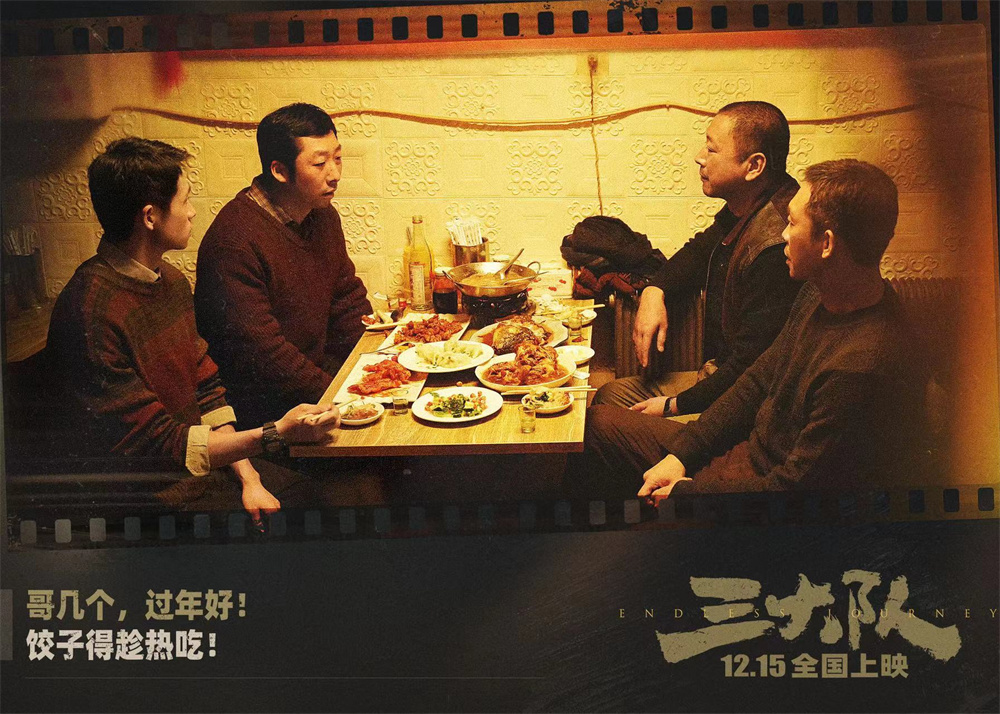
Stills of "The Three Brigades"
The Paper : Such a group portrait setting, including the scene where you just mentioned the three teams arresting human traffickers, reminded me of the Japanese sword-and-halberd film "Seven Samurai" and the Hollywood movie "The Magnificent Seven." How to draw inspiration from genre films and how to contain it just right? Let me share your thoughts.
Zhang Ji : The overall tone of this movie is to be based on the realism style. This is the biggest setting tone. In addition, what I write this time is about life. When writing about life, there must be a group relationship, a time span, and choices of coming and going, gathering and separation. On this basis, taking into account the audience's emotions and expectations, we will incorporate some elements of genre films, which will be very restrained and will never overwhelm the show.
"I love the members of the Third Brigade, and I admire Cheng Bing."
The Paper : In your opinion, what stereotypes have been formed in domestic criminal investigation-themed film and television dramas, including the development of the film so far, that can be broken in this film?
Zhang Ji : The movie "Third Brigade" is still more of a drama than a criminal investigation drama. We still have to write about people and spirit. Tolstoy has a saying that has a great impact on me, to the effect of "When does a man's story begin? It is when his spirituality overcomes his animality." This is certainly not the case in a man's youth. stage, but in the period of his transition from youth to middle age. In my creative world, I have always wanted to find a story about a man’s spiritual victory.
The Paper : Let’s talk about the image creation of Cheng Bing. For example, he has a mantra before every action: “Move!” In addition, there is a sentence written on the title page of Cheng Bing’s notebook: “No one can live in a vacuum.” How to understand it? Its relationship with the plot and the fate of the characters.
Zhang Ji : "Move!" This mantra was found by Zhang Yi and others, and it is a clean and crisp word. "No one can live in a vacuum" is a real detail I saw in my next life. When I was flipping through the files, I saw such a sentence written on one of the pages. It touched me deeply and I used it in the script. It points out the insights of a criminal policeman. You can understand that as long as the criminal commits a crime, he will definitely leave clues; you can also understand that the criminal policeman will be under pressure from all aspects when handling the case.
When I wrote about Cheng Bing, I used my own imagination to shape him after accumulating a lot of information. Because he is far away from life, we cannot reach him. In him, I wrote about a person who was tortured by life and himself, and he was incompatible with the people around him. The realization of his idealism was lonely and tragic. On the contrary, when I was writing about Cheng Bing's team members, I felt very relaxed because I could grasp them and write them with ease. But I think one thing that touches people about realism is the moral sense of the protagonist. This kind of moral sense does not need to be preached, and the natural interpretation is very moving. Simple moral concepts have always been contained in this film. If the story is good, it will be good. The times are moving forward. Some people keep up with the times or follow the trend, but only those who either stay in the past or are ahead of the times. Only people of this era will have interesting stories.
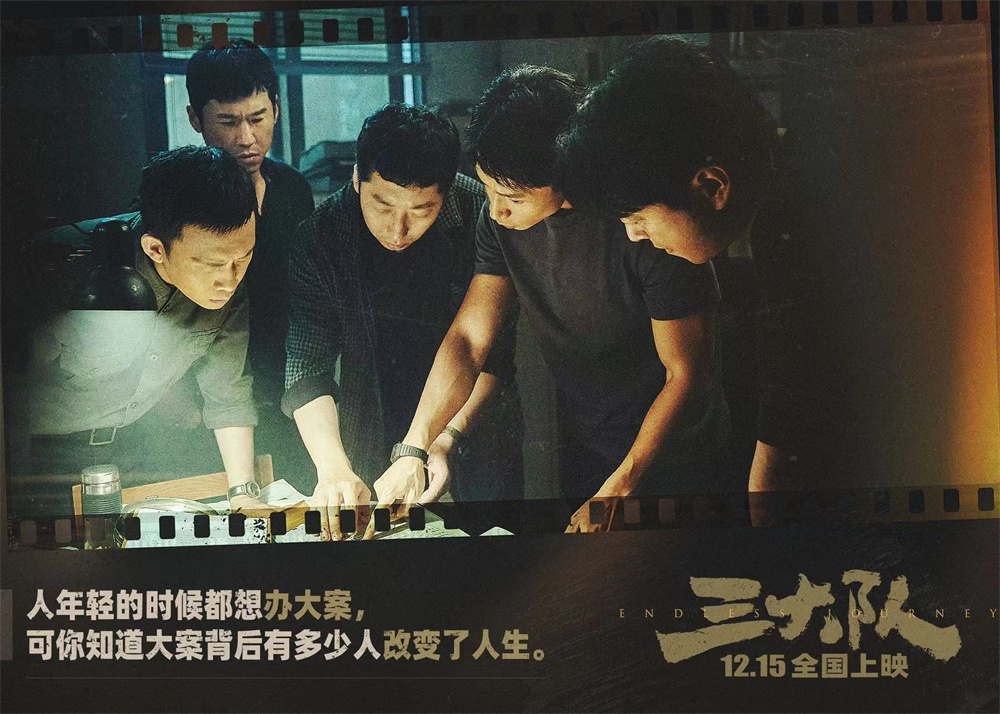
Stills of "The Three Brigades"
The Paper : Please talk specifically about Cai Bin played by Cao Bingkun, Ma Zhenkun played by Wang Xiao, and Liao Jian played by Zhang Zixian. They each represent different aspects of middle-aged men facing the pressure of life. Director Jia Zhangke said after the screening that it was an improvement for the film to face up to the choices of these team members. What do you think?
Zhang Ji : Actually, I love them and admire Cheng Bing. Writing about Cheng Bing is very difficult, but I am very happy when writing about these team members. And it is very easy for me to sympathize with the experiences of these people and shed tears. They are like my brothers, my family, and the characters in my previous film "Changsha Nightlife". The most emotional thing I wrote this time was about the departure of these few people. Respect for the choices of ordinary people is the proper meaning of realist works, and this does not require any psychological construction. Of course, as a screenwriter, you also need to have imagination. When writing Cheng Bing, I had to imagine his spiritual world. To complete the script writing of "The Three Brigades", both of these dimensions must be present.
The Paper : In the movie, Cheng Bing also wavered in his obsession with chasing the murderer. I remember one point where he wanted to send a text message to his relatives and friends to show that he "couldn't pursue them", but he hesitated when choosing the person to send it to. This episode was handled very well.
Zhang Ji : Cheng Bing is the main axis of the story, and chasing the murderer is his obsession. When will he decide to let go? I am writing about his cellmate Azhe (played by Zhang Xincheng) - Azhe was originally a weak person who was bullied in the detention center. He was helped by Cheng Bing and his soul was saved. After he was released from prison, he lived a normal life. . He helped capture Wang Eryong purely to repay his kindness, and died in the process. This is a huge blow to Cheng Bing, because Azhe is the most innocent, and the process of chasing the murderer must pay a price, but it can be paid by the members of the third brigade, or Cheng Bing can suffer the hardship himself, and Azhe and The most irrelevant person in the whole case. So when Cheng Bing left Azhe's widow and saw the peaceful lives of people in the park and on the streets, he collapsed at that moment.
It was originally written in the script that he took out his mobile phone and wanted to send a text message to his ex-wife, "I can't find it..." During the on-site shooting, Zhang Yi and Dai Mo changed it to "He didn't know who to send this message to" in the end. Hello, this part has been improved very well. This creation is very open, everyone has different systems but they can come together. I am somewhere between literary and commercial films. Photographer Dong Jinsong has been working with director Diao Yinan before. He is taking the route of literary films, and Si Si Cheng and the others have always been making commercial films, and this time it feels like everyone put what they are good at into it. It's like a wine cellar. Everyone puts their own good wine in it and brews a pot of new wine.
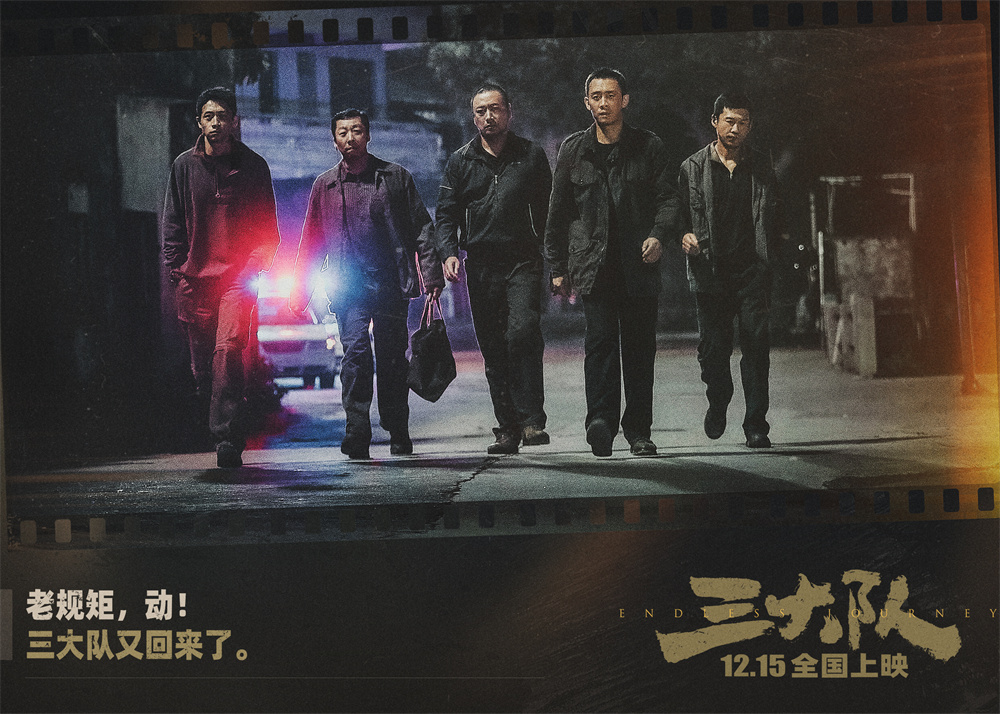
Stills of "The Three Brigades"
"I... am not me", confusion and confusion of identity
The Paper : In the movie, Wang Eryong didn’t reveal his true face until the end. While on the run, he used a knife to carve out the visceral face of a girl behind the mirror in the rental house where he was hiding. In addition, in the process of chasing the murderer, Cheng Bing was lonely and desolate. Once when he was walking on the street, he saw a broken image of himself in several mirrors. The use of mirrors as props makes me feel that this realistic film reveals metaphysical philosophy.
Zhang Ji : I considered my own identity in the original work. Cheng Bing turned out to be the captain of the criminal police. He became a prisoner and then an ordinary person chasing the murderer for thousands of miles. His identity was moved from "wearing official clothes" to the bottom of society. The fugitive Wang Eryong (played by Zhang Benyu), by chance, not only escaped repeated arrests, but also reestablished a family and seemed to be living a good life. In a sense, their identities have been changed. On the way to escape, Wang Eryong used a knife to carve out a girl's face in the tenant's house. The face itself is also a symbol of status. This shows his anti-social personality and lack of empathy and sympathy. At the same time, he is carved on the wall behind the mirror, which also reflects his confusion about his own identity.
The discussion of identity is a big proposition in modern philosophy. There is a very key line in the movie. After Wang Eryong was arrested at the police station, Cheng Bing shouted to him, "Wang Eryong!" He silently muttered to himself, "I... (Wang Eryong) is not me." This sentence These words point out the confusion of his identity. Maybe after committing the crime, he warned himself every night that he was not the criminal and hypnotized himself. This is a very modern expression. Including what you mentioned, Cheng Bing saw a mirror on the street. He saw several mirrors. The reflection of himself in the mirror was even broken. The mirror image is also a proposition in modern philosophy, reflecting his confusion about his own identity. But the reason why a hero is a hero. Although Cheng Bing has been shaken and confused, what he has always insisted on is precisely "I am me" - although "I" no longer wears a police uniform, "I" have a responsibility to myself. clear cognition.
The Paper : The ending of the movie is heart-wrenching. The reason why the three brigades were imprisoned collectively at that time was that only oral confessions could be used to convict the suspects and solve the case. Cheng Bing's pursuit of the murderers also relied on manpower and experience. To put it bluntly, human factors played a key role. But the criminals were eventually punished because of the development of technology, nationwide networking, and DNA comparison. What do you think of this ending?
Zhang Ji : Nowadays, "handling cases without confession" is advocated, and there is no longer so much emphasis on solving cases within a time limit. These reflect the progress of the judiciary and the changes of the times. Through DNA network comparison, identification can be done on the spot. This is what we saw during on-site investigations, including face recognition by probes, which has greatly improved the detection rate of today's crimes. It can be said that criminals have no way to hide.
Cheng Bing actually traveled thousands of miles alone, using the most primitive visiting platoon to chase the murderer, and even had to sort out the garbage discarded by the suspect to confirm his identity, but his spirit is the most touching, and this spirit will never go out of style. . I wrote about his loneliness and his incompatibility. Heroes are separated from ordinary people. I think no hero is particularly happy in life. He must bear the burden of life. Even if he has no one to rely on, even if he is isolated and helpless, he will persevere and pursue it to the end.


